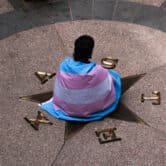COPENHAGEN, Denmark (CN) — Saudi Arabia and Crown Prince Mohammed bin Salman’s "land of the future" city project NEOM will get a serious financial boost from Danish logistics and freight operator DSV.
Last week, the company revealed it has committed to a $10 billion joint venture with the Saudi government to provide ground, sea, and air logistics services for NEOM, including infrastructure, transport and delivery of goods and materials.
NEOM is meant to be a high-tech city situated in the northwestern desert of Saudi Arabia, running on advanced technologies such as drones, robot workers and self-flying cars. A key objective is to create a modern city that uses renewable energy, such as wind, solar and "green hydrogen," thus marking a breakaway from the country’s profitable oil sector.
The project is a strategic part of Saudi Arabia’s Vision 2023 of overall transforming its economy, creating a hub for international trade and improve its citizens’ ability to pursue goals and opportunities. The new utopian city will consist of different residential zones, each with a unique landscape design.
DSV's CEO Jens Bjørn Andersen called the collaboration an "opportunity to support a development on the forefront of innovation, technology, and digital transformation" and emphasized the growth potential and creation of thousands of jobs.
The Danish logistics company will fund 49% of the joint venture, making the total investment worth $5 billion.
While DSV underlines how the project will foster a more sustainable generation and play a role in the Middle Eastern country’s transition, several experts remain skeptical including Andreas Rasche, professor of business in society at Copenhagen Business School.
“Saudia Arabia is known to be a high-risk country when it comes to joint ventures, because of its history of human rights abuses. Therefore, it is necessary to present an in-depth human rights due diligence.” said Rasche.
Rasche noted DSV has not yet published a risk assessment and action plan for handling potential problems during the construction of NEOM, such as insufficient rights for the workers or forced evictions.
The latter has already been an issue. In May, the United Nations warned three members of the local Howeitat tribe were sentenced to death by the Saudi Arabian government, after they were arrested for protesting the forced evictions of people in their area during the initial construction of a 105-mile-long city called “The Line."
The U.N. criticized how authorities had reportedly "carried out a series of actions to evict members of the Howeitat tribe from their homes and traditional lands in the name of the NEOM project since January 2020."
Rasche said it is naive to assume that there will not be any human rights issues in a joint venture with a country that still allows corporal punishment for crimes, including amputating legs or arms.
While cross-country border business ventures can help push positive change in societies, Rasche noted the lack of specific plans for how to create and secure permanent changes in Saudi Arabia through the NEOM-collaboration.
“For instance, with the World Cup in Qatar, we saw similar pledges, but nowadays not much has changed. The country has by and large gone back to its pre-tournament working conditions," Rasche said.
Saudi Arabia is indeed a complex country to navigate, according to Fannie Agerschou-Madsen from the Danish Institute of International Studies and an expert on politics and society in the Middle East.
Agerschou-Madsen said Saudi society is characterized by a big and wealthy upper middle-class and an increasing group of poor working Saudi citizens, while migrant workers have had very little success with securing basic worker’s rights. Today, around a third of the total population in Saudi Arabia are migrant workers mainly from African countries like Ethiopia and Eritrea, and Asian countries like Bangladesh and the Philippines.
”It is somewhat paradoxical, because the new Vision 2030 reform has led to significant improvements for the citizens. There are more jobs, increased flexibility to live life as you want, and women have a lot more freedom now than they used to,” she said, but noted Saudi Arabian rule remains very authoritarian with an increase in the number of imprisoned human rights activists over the last five years.
It is not new that Danish businesses invest in the region, as Denmark has an open and active trading policy with Saudi Arabia. However, there is a difference between investing in a country and entering a full-blown partnership as DSV has done, Agerschou-Madsen said.
“And NEOM is a prestige project credited to the Crown Prince. It directly serves to legitimize the Saudi Arabian regime,” she said.
“The futuristic city will be exclusive and modern to live in. Yet, it is important to note how the government calls it a ‘cognitive city.' There will be more robots than humans, heavy surveillance and automized security forces. In an authoritarian state, that does not necessarily sound like an ideal foundation for freedom and human rights," Agerschou-Madsen said.
The DSV stock dropped 11% over the last week and 25% in October. The company declined comment for this story.
Subscribe to Closing Arguments
Sign up for new weekly newsletter Closing Arguments to get the latest about ongoing trials, major litigation and hot cases and rulings in courthouses around the U.S. and the world.









